HVAC contractors face numerous risks, from accidents and property damage to potential lawsuits. Liability insurance essentials for HVAC contractors: what you need to know is essential to protect your business from these financial pitfalls. In this article, we’ll cover the key types of liability insurance every HVAC contractor needs to know, ensuring you are well-protected and compliant with legal requirements.
Key Takeaways
- Liability insurance is essential for HVAC contractors to protect against financial losses from accidents, property damage, and lawsuits, and is often required to secure contracts.
- HVAC contractors need various types of liability insurance, including general liability, professional liability, and workers compensation insurance, to ensure comprehensive protection against multiple risks.
- Understanding policy details, including exclusions and local compliance requirements, is critical for HVAC contractors to navigate insurance effectively and maintain professional credibility.
The Importance of Liability Insurance for HVAC Contractors
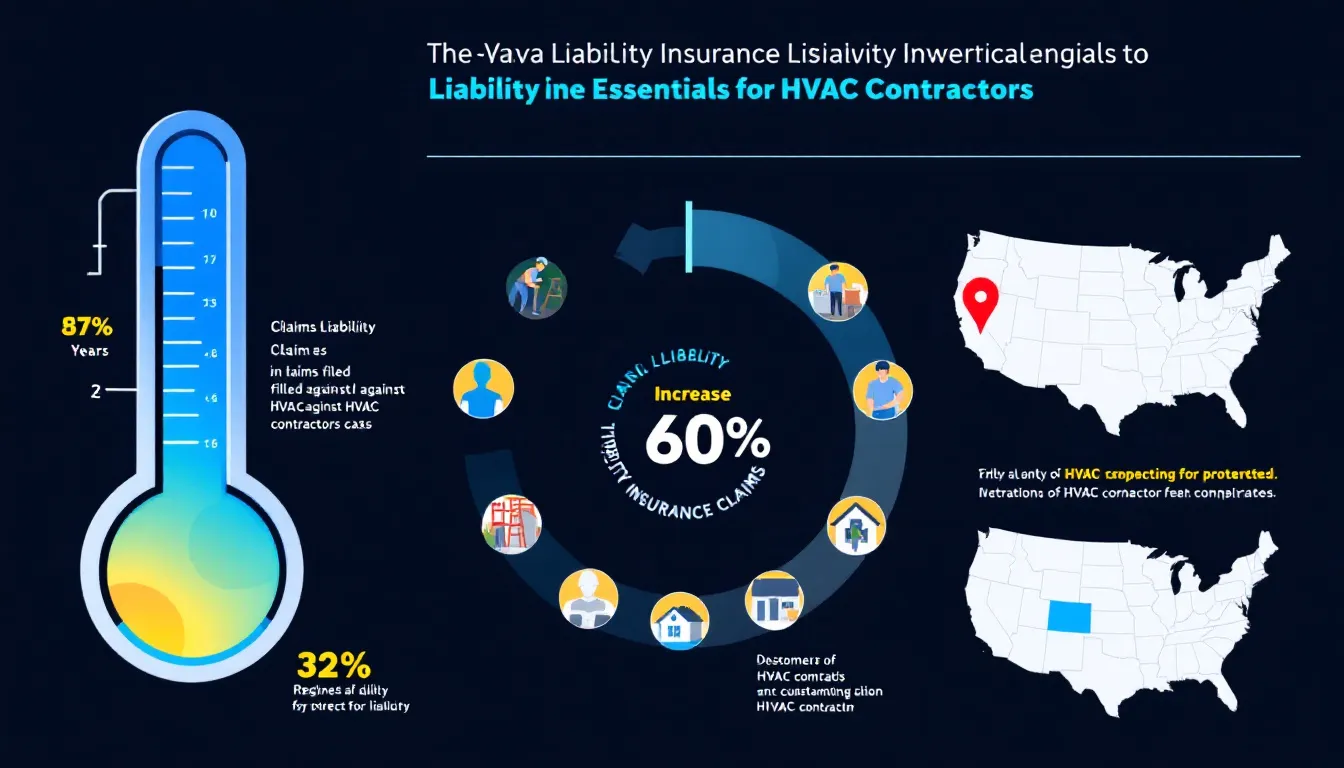
The HVAC industry is fraught with potential financial pitfalls. Accidents, property damage, and even lawsuits can arise from the day-to-day operations of an HVAC contractor. Without liability insurance and hvac insurance, recovering from such incidents can be nearly impossible, leading to significant financial losses and possibly even financial ruin. Additionally, understanding the complexities of hvac systems is crucial for preventing such issues in an hvac contracting business. Furthermore, hvac liability insurance is essential for protecting against unforeseen circumstances in the construction industry.
Often, liability insurance is a prerequisite for securing contracts. Many clients and projects require proof of insurance before any work can commence. This requirement not only protects your business assets but also shows a commitment to professionalism, ensuring that you can take on lucrative projects without hesitation.
Types of Liability Insurance Essential for HVAC Contractors
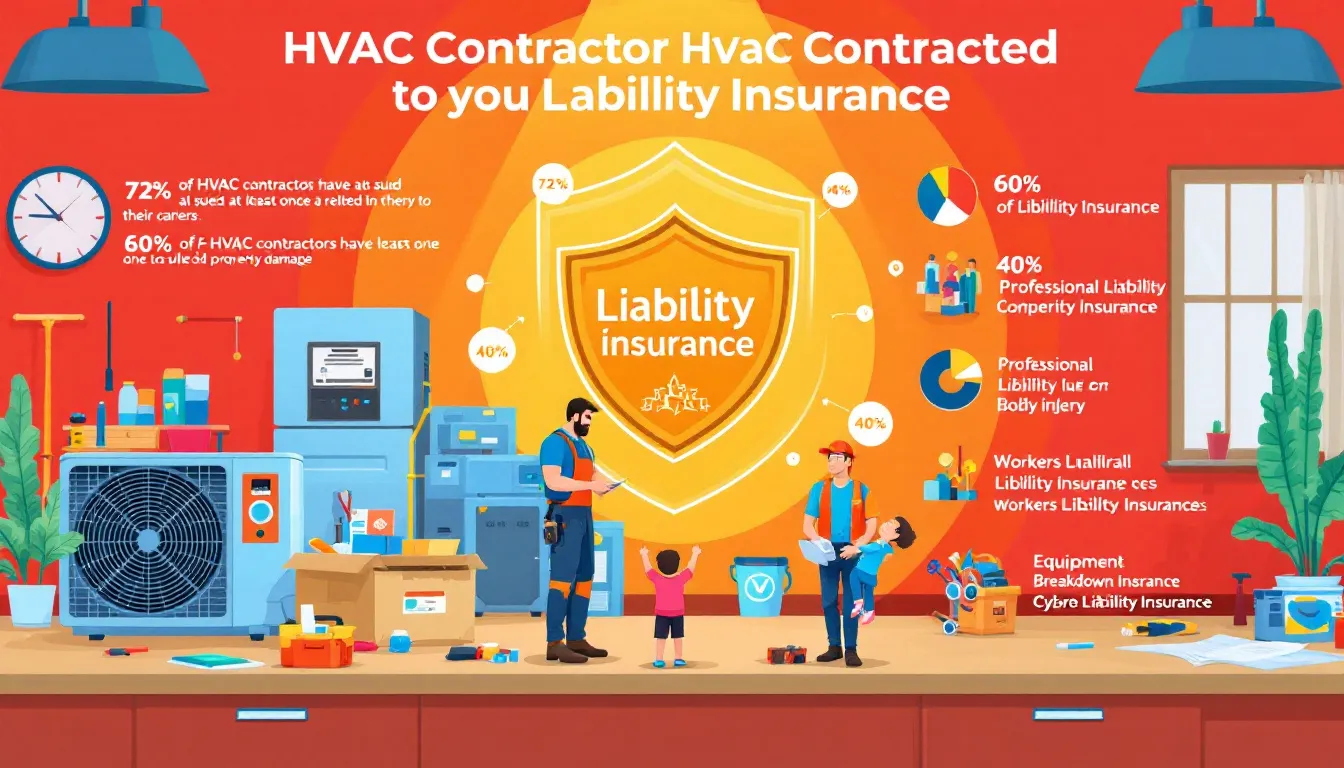
HVAC contractors require a range of liability insurance types to fully protect their business from various risks. General liability insurance is indispensable as it covers a wide array of liabilities, including product and premises-related claims. This insurance is the first line of defense against common risks associated with HVAC work.
Additionally, professional liability insurance, often referred to as errors and omissions (E&O) insurance, is crucial for protecting against claims of professional negligence or mistakes. Workers compensation insurance is another essential, covering medical expenses and lost wages for employees injured on the job.
Together, these insurance types form a robust safety net for HVAC contractors, as insurance ensures comprehensive protection against potential claims and financial losses.
General Liability Insurance: Protecting Against Common Risks
General liability insurance is the cornerstone of HVAC contractor insurance, offering vital financial protection against injuries and property damage that may occur during work. Imagine accidentally damaging a client’s property or causing an injury on the job site. The costs associated with such incidents can be astronomical, but with commercial general liability insurance, these expenses are covered, providing peace of mind.
This insurance not only covers repair or replacement costs for property damage but also includes medical expenses and medical bills for injuries sustained by third party claims due to the contractor’s negligence. This is particularly important as it helps mitigate the financial burden of unexpected mishaps. Furthermore, general liability insurance covers legal fees, legal costs, and settlements arising from claims, ensuring that HVAC contractors have the necessary support to defend against potential lawsuits, which includes attorney fees.
In addition to financial protection, general liability insurance is often a requirement for obtaining necessary licenses and meeting client requirements. Clients and regulatory bodies frequently demand proof of insurance to ensure that contractors are prepared to handle potential risks associated with their work.
Managing the risks associated with HVAC work, general liability insurance establishes a solid foundation for a secure and thriving air conditioning hvac business.
Professional Liability Insurance: Coverage for Errors and Omissions
Professional liability insurance, also known as errors and omissions (E&O) insurance, is a safeguard against claims of professional negligence or mistakes. Unlike general liability insurance, which covers physical damage and injuries, professional liability insurance protects against claims related to the quality of professional services provided.
For HVAC contractors, this means coverage for design errors, oversight, or failure to meet industry standards. Should a client claim that your professional services resulted in financial loss, professional liability insurance will help cover legal defense costs and settlements, ensuring that your business can defend itself against such claims without incurring crippling expenses.
General liability insurance does not cover professional services-related liabilities, making professional liability insurance a crucial component of a comprehensive insurance plan for HVAC contractors.
Workers Compensation Insurance: Ensuring Employee Safety
Workers compensation insurance is a critical aspect of HVAC contractor insurance, designed to cover medical expenses and lost wages for employees injured on the job. HVAC work often involves lifting heavy equipment, dealing with electrical hazards, and working at heights, all of which pose significant risks to employees.
In the unfortunate event of a workplace injury, workers compensation insurance provides:
- Medical coverage
- Wage replacement
- Death benefits
- Funeral expenses if necessary
Additionally, most states require businesses to carry this insurance, especially if they have more than one employee, to ensure compliance with local regulations and avoid potential lawsuits.
Additional Coverage Options for Comprehensive Protection
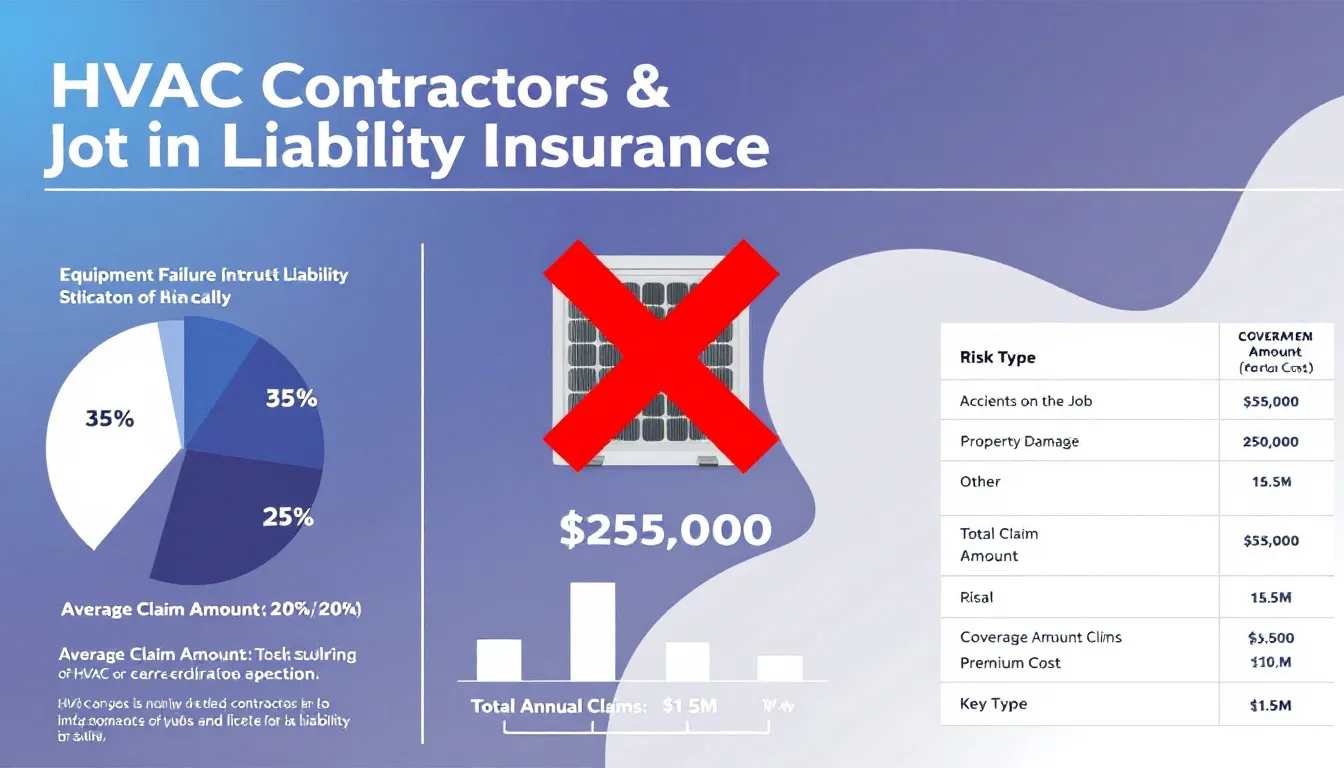
HVAC contractors seeking comprehensive protection should consider several additional coverage options, including commercial property insurance. Business insurance is one such option, covering potential liability exposures arising from physical damage to property, ensuring that your business can continue to operate smoothly.
A business owner’s policy (BOP) is another excellent choice, combining property insurance, liability, and business interruption coverages into a single, cost-effective package. This can be particularly beneficial for HVAC contractors as it simplifies insurance management while providing broad protection for business property. Additionally, tools and equipment coverage protects against the loss, damage, or theft of essential tools, minimizing downtime and keeping projects on track.
Commercial auto insurance is also crucial, covering costs related to vehicle repair or replacement after accidents. The right coverage, such as excess liability insurance and liability coverage, offers an additional layer of protection by covering costs that exceed existing liability limits, ensuring peace of mind in high-risk situations.
Factors Influencing the Cost of Liability Insurance
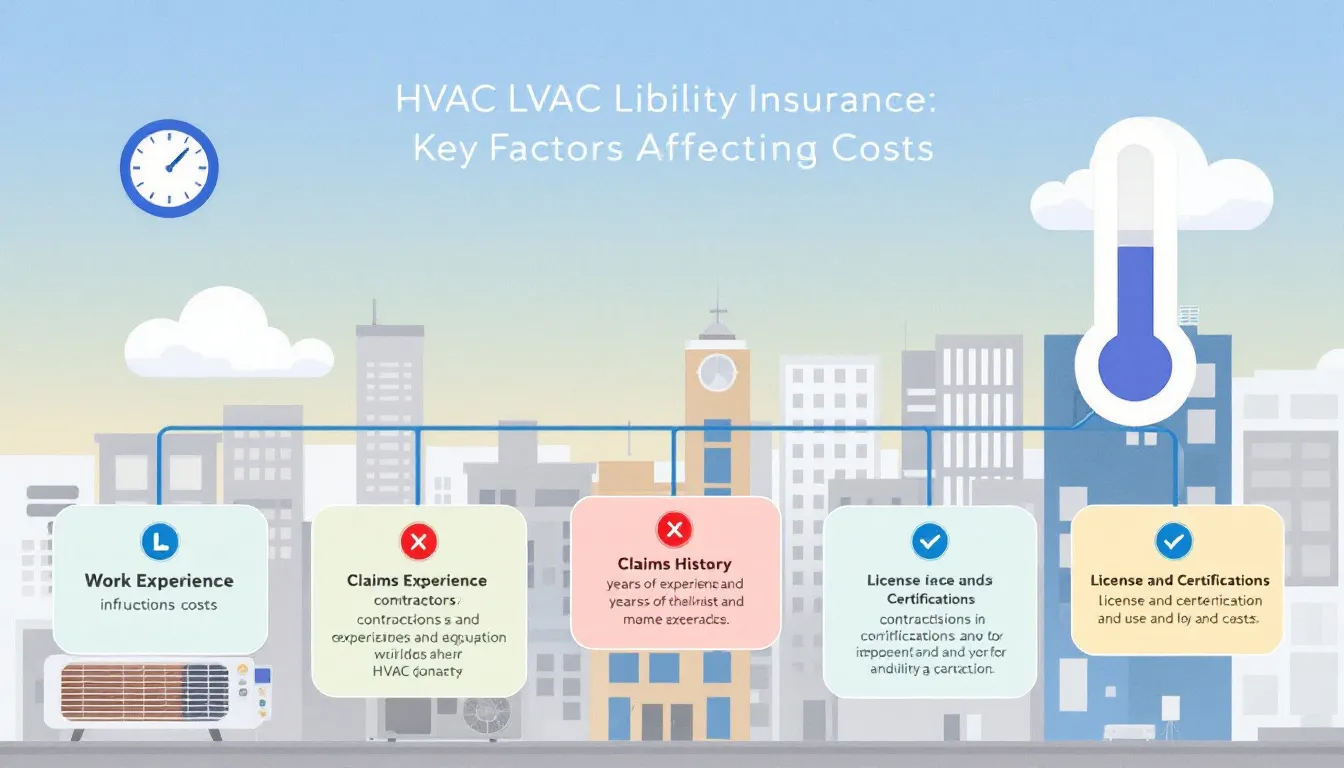
Several factors influence the cost of liability insurance for HVAC contractors, including hvac insurance costs. The number of employees is a significant factor; more employees mean higher potential risks, leading to increased premiums. Similarly, the amount of foot traffic in the business area can impact costs, as high foot traffic raises the likelihood of accidents.
Claims history is another critical factor. Contractors with a history of frequent claims may face higher insurance rates, reflecting the increased risk perceived by insurers. The type of work performed and the associated risks also play a role, with more hazardous tasks leading to higher premiums.
Additionally, the level of experience and the implementation of safety protocols can affect insurance costs. Experienced contractors with robust safety measures in place may benefit from lower premiums. Local regulations also influence costs, as stricter regulations often lead to higher premiums.
How to Choose the Right Insurance Policy
Choosing the right insurance policy requires careful evaluation of specific coverage needs. HVAC contractors should start by assessing their business size, nature of work, and local regulations to determine the necessary coverage. Comparing multiple quotes from different insurers is essential to find the most suitable policy.
When evaluating these insurance policies, focus on coverage limits, deductibles, and any additional coverages that may enhance protection, including higher coverage limits and adequate coverage. Consulting with a licensed insurance broker can provide valuable insights and help navigate the various options available.
Working with an independent insurance agent can also be beneficial, as they can provide quotes from multiple insurance providers and assist in finding the best coverage at competitive rates.
Understanding Policy Exclusions and Limitations
Understanding the exclusions and limitations of an insurance policy is crucial to avoid unexpected surprises in the event of a claim. Common exclusions for HVAC contractors include pollution clean-up costs and damages resulting from normal wear and tear or maintenance neglect.
Meeting maintenance requirements like regular filter changes and annual professional inspections can prevent claim denials. Failure to adhere to these requirements can lead to denied claims, emphasizing the importance of understanding policy details and maintaining proper documentation.
Legal Requirements and Compliance
Compliance with legal requirements is non-negotiable for HVAC contractors. Many states require HVAC contractors to have liability insurance as a legal obligation, with some requiring proof of general liability insurance as part of the licensing process. These regulations ensure that contractors are financially prepared to handle potential risks and protect their clients.
Workers’ compensation insurance is also commonly required, with states setting their own regulations and penalties for non-compliance. HVAC contractors must verify and adhere to local regulations to avoid serious financial penalties, including fines and stop work orders.
Claim Process: What to Do When an Incident Occurs
In the event of an incident, HVAC contractors must document all details, including the incident, repair process, maintenance records, and receipts.
Timely notification to the insurance company is essential to prevent delays in processing the claim and avoid potential further damage.
Enhancing Professional Credibility with Liability Insurance
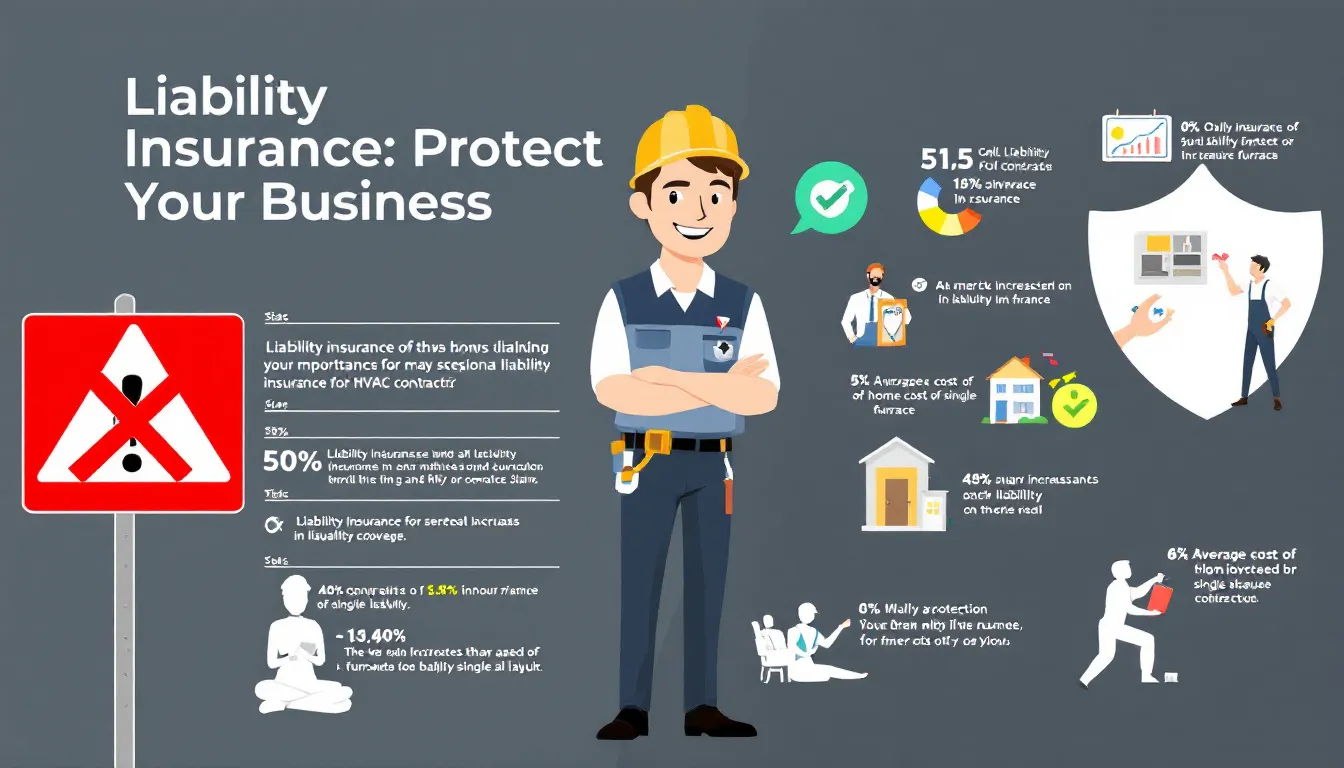
Having liability insurance significantly enhances an HVAC contractor’s professional credibility. Clients are more likely to trust and hire HVAC professionals who demonstrate a commitment to professionalism and responsibility through proper insurance coverage.
Furthermore, liability insurance allows independent contractors to focus on delivering quality service without the constant worry of financial repercussions from unforeseen incidents and liability risks. This preparedness not only offers a competitive advantage but also builds a reputable and trustworthy professional image.
Summary
Liability insurance is an essential aspect of running a successful HVAC business. From protecting against common risks with general liability insurance to covering professional mistakes with E&O insurance, these policies form a comprehensive safety net for contractors. Workers compensation insurance ensures employee safety, while additional coverages provide broader protection.
Choosing the right insurance policy involves evaluating specific needs, comparing quotes, and consulting with brokers. Understanding policy exclusions and legal requirements further ensures that contractors are well-prepared to handle potential claims. Ultimately, having proper insurance enhances professional credibility and provides peace of mind, allowing HVAC contractors to focus on their core business operations.
Frequently Asked Questions
Why is liability insurance important for HVAC contractors?
Liability insurance is essential for HVAC contractors as it safeguards against financial losses from accidents and lawsuits, while also covering legal fees and fulfilling contract requirements. This protection ensures contractors can operate without the fear of devastating financial repercussions.
What types of liability insurance do HVAC contractors need?
HVAC contractors need general liability insurance, professional liability insurance, and workers’ compensation insurance to protect against various risks associated with their work. These cover damages, errors, and employee-related injuries effectively.
What factors influence the cost of liability insurance for HVAC contractors?
The cost of liability insurance for HVAC contractors is primarily influenced by the number of employees, claim history, the nature of the work, experience level, safety protocols, and local regulations. Addressing these factors can help contractors manage their insurance costs effectively.
How can HVAC contractors choose the right insurance policy?
To choose the right insurance policy, HVAC contractors should assess their specific coverage needs, compare multiple quotes, and consult with licensed insurance brokers or independent agents for expert guidance. This ensures they secure comprehensive protection tailored to their business.
What should HVAC contractors do when an incident occurs?
HVAC contractors should immediately document all incident details and notify their insurance company to facilitate timely claim processing. This approach ensures that all aspects of the situation are officially recorded and addressed.
